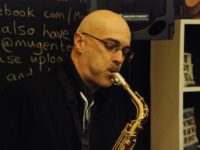by Pico
Danilo Pérez is a name that’s come up often in this space whenever I’m boasting about what big names such-and-such artist has performed and/or recorded with. So, on the occasion of Pérez’s latest CD Providencia, perhaps it’s time to devote a little space to the guy who has helped along the careers of so many other young talents.
There’s not a lot of jazz afficianos who don’t know about the brilliant Panamanian-born pianist Pérez; he’s been a fixture on the NYC jazz scene at least since his stint in Dizzy Gillespie’s United Nations Orchestra from 1989-92 and participated in Grammy-winning recordings by that ensemble as well as Arturo Sandoval’s Danzon. He’s also played in bands led by Wynton Marsalis, Wayne Shorter, Joe Lovano, Steve Lacy, Jack DeJohnette, Charlie Haden, Michael Brecker, the list goes on. Having built up his credentials to such an impressive degree, he elevated his stature even further when he started leading his own dates in 1992 and The Journey from the following year won him buckets of critical kudos. He’s continued to make records for himself and others while concurrently serving as a musical and cultural ambassador of his native Panama, ambassador of Goodwill for UNICEF and a distinguished faculty member at Boston’s Berklee School of Music.
Pérez does not draw a demarcation line between his humanitarian work and his music; he is a man who deeply believes that music can be an effective instrument for the betterment of mankind. That’s the major theme for this CD, his debut album for Mack Avenue Records. Providencia means “Providence” in English. To Pérez, it means “standing up for the future of the next generation of children.” It’s a record of exploration, discovery and joy.
The style of jazz that is Pérez’s signature combines post-bop/modern jazz with classical and Afro-Cuban/Latin folk melodies. Sometimes he combines these three streams into one composite style, and other times, he plays them discreetly. His approach to the piano is not one I’d call heavy-handed nor a particularly light touch, it’s right about in the middle with a predilection for playing full chords over extended right hand single note forays, and he chooses perhaps different notes than others would choose, but they never sound out of place. Pérez is his own man when it comes to playing style or else he wouldn’t be where he is today, near the top of the current jazz heap.
For personnel, Pérez begins with his long-time rhythm section of Ben Street (bass) and Adam Cruz (drums). Supplementing them, depending on what each arrangement calls for, are Rudresh Mahanthappa (sax), Jamey Haddad (percussion), Ernesto Diaz (congas), Sara Serpa (vocals), and a woodwinds quintet out of Boston.
“Daniela’s Chronicles” kicks things off with a five-part suite, which each movement commemorating each year in the young life of Pérez’s eldest daughter. Sticking with just the trio format here (except for some steel drums added in one of the middle segments), the song moves through tempos and harmonies, but the music flows fluidly from one movement to another, maintaining coherency throughout. As a ten minute track covering his major areas of style, it’s an ambitious way to start off a record, but as an introduction to the rest of the album, it serves to prepare listeners to what’s in store afterwards.
Elsewhere, the songs tend to be more narrowly focused, but each reveals a different angle of his artistry: “Bridge of Life” (Parts I and II), puts together chamber music rendered by the woodwinds quintet with trio Latin jazz. “The Oracle,” a dedication piece for his late mentor Charlie Banacos, is a stellar instance of advanced jazz composition and one where Mahanthappa solos memorably on. “Galactic Panama” utilizes the joyful rhythmic gait of Latin American to contrast with more somber chord progressions; the interplay between Pérez and Mahanthappa is a delight to listen to closely. The two also collaborate on a couple of brief piano/saxophone only improvisations, “The Maze: The Beginning” and “The Maze: The End,” with each piece on opposing ends of the intensity scale.
Out since August 31, Providencia is a record by an artist who isn’t content to rest on laurels or is done trying to change the world. The scope of the music in here is reflective of the problems of the scope of the world’s problems, but also reflective of its promise to be a better place to live. At least, that’s the vision of Pérez, and while he might not achieve all the lofty ideals he has for the coming generations, he certainly knows how to articulate them through his music.
- Matthew Shipp – ‘The Cosmic Piano’ (2025) - June 17, 2025
- Ivo Perelman & Matthew Shipp String Trio – ‘Armageddon Flower’ (2025) - June 16, 2025
- Claudio Scolari Project – ‘Bloom’ (2025) - June 12, 2025




